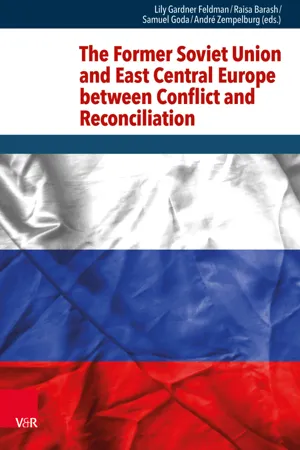
The Former Soviet Union and East Central Europe between Conflict and Reconciliation
- 230 pages
- English
- PDF
- Available on iOS & Android
The Former Soviet Union and East Central Europe between Conflict and Reconciliation
About This Book
This volume examines the role of identity formation and stages of sequencing of the steps of reconciliation – which is an enduring rather than ad an ad hoc phenomenon. RIPAR 4 asks for both the challenges to it from the domestic and international systems and the actors involved, as well as for the role of »history, « »memory« and »remembrance« either as catalysts for or obstacles to reconciliation. The analyzing of the connection among the past, the present and the future in actual or prospective reconciliation embraces all these topics and questions.Influenced by the crisis in the former Sovjet Union following the March 2014 Russian annexation/integration of Crimea and the movement of Russian soldiers into Eastern Ukraine to aid Ukrainian separatists the essays in this volume were written in 2015. »Reconciliation« is a frequently ill-defined term. As an aspiration in this volume it encompasses three senses: an incipient, thin and minimal form amounting to passive, peaceful coexistence after enmity; a more elaborate, intermediate and engaged form that is captured by the term rapprochement; and a thick or fuller form denoting active friendship, empathy, trust, magnanimity and, ultimately, amity. Beyond the definitional goal, the volume addresses ten themes. Firstly, reconciliation is being questioned as a process and/ or a terminal condition. A view is made on the requirements for the transition from conflict to a reconciliatory process, and the obstacles to beginning a process of reconciliation. Its »soft« and »hard« expressions inter alia in emotional and political dimensions are also subject of the author's interest. The observations about conflict and cooperation offered in this volume wish to add significantly to the burgeoning literature of reconciliation. These essays demonstrate that we need a variety of disciplinary and theoretical perspectives to grapple with conflict and to promote reconciliation.
Frequently asked questions
Information
Table of contents
- Title Page
- Copyright
- Body
- Lily Gardner Feldman: Introduction to the Present Volume
- Martin Leiner: Setting the Stage: An Introductory Clarification of Concepts of East Central Europe
- Samuel Goda: The OSCE and Reconciliation: between Theory and Practice
- Raisa Barash: Mythologization of the Soviet Past and Prospects for Historical Reconciliation in Russia
- Olga Konkka: Russian Internal Narratives about the “Western Enemy” as a Barrier for Reconciliation: The Example of School History Textbooks
- Matthew Rojansky: Russian-Ukrainian Relations: Conflict and Reconciliation over Shared History
- Karina V. Korostelina: Reconciliation in Ukraine: within and across the boundary
- Katja Wezel: Memory Conflicts as Barrier to Reconciliation: Post-Soviet Disputes between the Baltic States and Russia
- Annamária Kiss: The Means and Ends of Russo-Georgian “Normalization”: What is beyond the “Red Lines”?
- Jolanta Jonaszko: Disarming Memory: The Katyn Massacre and Reconciliation in Polish-Russian Relations 1990–2015
- Klaus Bachmann: Polish-Ukrainian Reconciliation after World War II
- Mimoza Telaku and Shifra Sagy: Perceptions of Collective Narratives and Acculturation Attitudes: The case of Serbs and Albanians in Kosovo
- About the Editors
- About the Authors